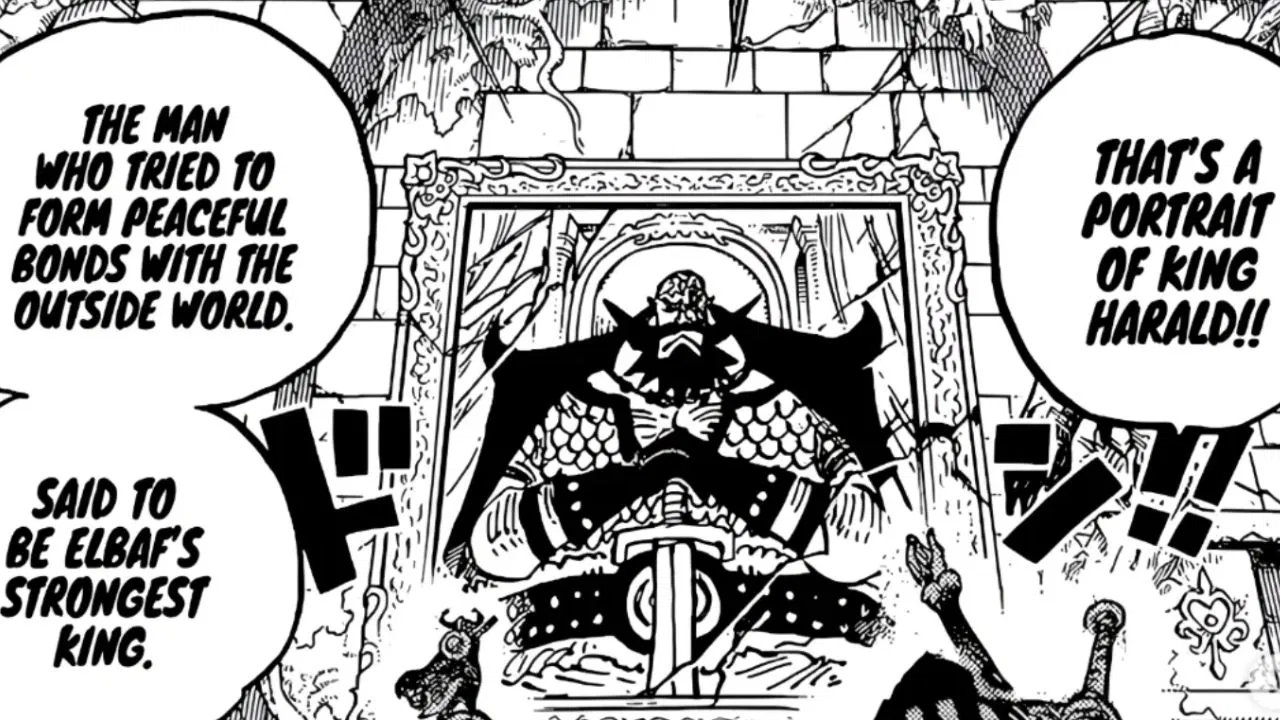A chapter about muscle that turns into a chapter about math. Power measured as risk, loyalty weighed against survival, and one very ugly equation for a king.
Elbaph’s Moment of Truth
For decades, Elbaph has lived in One Piece as a promise: a land of giants, mythic warriors, and Viking honor. The Final Saga finally delivers it not as a playground for battle, but as a political crucible. Eiichiro Oda has turned the nation of giants into something far more consequential—a fault line where loyalty and statecraft grind against each other, and where the fate of friends can be traded for the survival of a kingdom.
In Chapter 1158, King Harald faces an impossible choice. The Five Elders extend their hand: bring Elbaph under the World Government’s wing, but only if Rocks D. Xebec is sacrificed. The offer comes wrapped in promises of protection and status, but the cost is betrayal.
The Five Elders’ Contract
The Gorosei have always worked in shadows, presenting themselves as guardians of order while relying on manipulation and intimidation. Their bargain with Harald is their playbook distilled: give up a comrade, gain legitimacy.
For Harald, the choice is unbearable. Elbaph’s code is loyalty, pride, and warrior bonds. To betray Xebec is to fracture all of those. Yet to refuse is to risk annihilation. He is reduced from king to pawn, choosing not between honor and dishonor but between two forms of ruin.
The Clash of Titans
When Harald meets Rocks, fists do the talking. Their confrontation erupts into a Haki-laden collision, but no victor emerges. Instead, both fall, exhausted and broken. What truly dies is their bond.
This is Oda’s point: the most devastating losses are not always on the battlefield, but in the space where politics poisons friendship. Rocks survives. Harald survives. The friendship does not.
Xebec in a New Light
Rocks D. Xebec has always been a mythic shadow—feared, whispered about, remembered as a monster who nearly overturned the world. Yet Chapter 1158 strips away some of that distance. Here he is not an abstract terror, but a man who had friendships, trust, and camaraderie. That he is undone by betrayal rather than defeat makes his legend even more tragic.
His legacy is no longer a single battle at God Valley. It is also the scar of a king’s broken promise.
The Red-Haired Mother
In a parallel thread, Oda drops another bombshell: on God Valley, a red-haired woman appears with two children, Shanks and Shamrock. Her identity is not fully explained, but the implication is powerful. For a character as enigmatic as Shanks, this glimpse of his lineage deepens his mystery without dissolving it.
It ties Shanks’ destiny to the same political currents shaping Harald’s decision, underscoring that the Final Saga is not just about pirates and kings, but also about families, bloodlines, and the burdens they inherit.
Power Politics Over Power Levels
This chapter signals a deliberate shift in the texture of One Piece. For most of the series, battles have been the crucible of choice: Luffy versus Crocodile, Ace versus Blackbeard, Kaido versus the world.
Chapter 1158 tells us the endgame is more complicated. The deadliest blows may come not from fists but from contracts, betrayals, and political deals. The Gorosei do not beat Harald in combat—they beat him on paper.
The Fandom Reacts
The community’s response has been electric:
-
Shock: that Elbaph, long framed as a kingdom of honor, would be marked by betrayal.
-
Anger: at Harald, whose choice feels like a betrayal of giant pride.
-
Awe: at Oda’s craft, elevating Elbaph from myth to political lynchpin.
Fans have compared the moment to the moral fractures of Game of Thrones or the tragedies of Greek epic. Elbaph is no longer simply a battlefield—it is the pivot point of the saga.
Why It Matters
-
Elbaph’s Alignment: Harald accepts the Gorosei’s terms, yet in the present Elbaph remains unaffiliated. That means this flashback is the start of a long, bitter story of negotiations and betrayals.
-
Xebec’s Legacy: His legend is reshaped, no longer only about brute force but also about survival and treachery.
-
The Straw Hats’ Road: When they finally set foot in Elbaph, they won’t find a unified land of heroes—they’ll walk into a kingdom fractured by politics and shame.
-
Foreshadowing: If even giants can be manipulated, what chance do smaller nations have?
A Tragedy on the Level of Myth
The resonance of Chapter 1158 lies in its timelessness. From Achilles’ quarrel with Agamemnon to modern tales of diplomacy under duress, stories of betrayal under political pressure cut across cultures. Harald’s choice places him not only among One Piece’s kings, but in the lineage of tragic leaders across history.
He is not a villain. He is a human ruler, choosing the ledger over the sword, and finding that neither path offers salvation.
Conclusion: The Saga Evolves
Chapter 1158 is not about who is strongest. It is about who can live with the price of survival. Rocks staggers but grows larger in myth. Harald breaks and becomes more human. Shanks’ origin glimmers in the margins. And the Gorosei remind us that the Final Saga is not only a war of strength but also a war of politics.
The betrayal at Elbaph is more than a twist. It is a declaration. One Piece has entered its most political, most tragic, and most ambitious phase yet.

